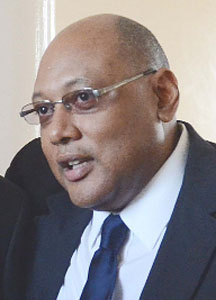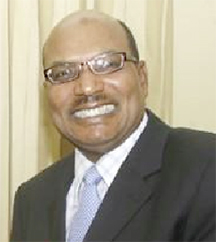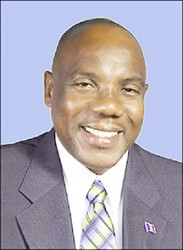The just-concluded regional parliamentary conference has not been another talk shop, Guyana’s Speaker Raphael Trotman said yesterday, while announcing the passage and adoption of three resolutions that would see an outreach to youth and persons with disabilities.
Trotman told reporters that even before the start of the 16th Biennial Regional Conference of Presiding Officers and Clerks of the Caribbean, the Americas and the Atlantic Region of the Commonwealth Parliamentary Association (CPA) he had noted that previous ones had not yielded much more than reports, and promises to attend future conferences.
Determined to make a difference, he said, the various Speakers, Presiding Officers and Clerks of the 14 countries which participated in the bi-annual conference worked towards producing something more tangible and meaningful than reports and nice remarks.
He said that three resolutions were passed, and that the development is a welcomed change from the tradition of closing the conference with pleasantries and the eventual submission of reports.

Outlining and explaining the three resolutions, all of which were passed unanimously, was Speaker of Trinidad’s legislature, Wade Mark. The first resolution was for the establishment of an Executive Steering Committee to be comprised of a number of Presiding Officers and other officers who will serve as the body responsible for coordinating the activities between the conferences.
“We didn’t have it before (but) we have now established it,” Mark proudly told reporters. The Regional Secretary will serve as the Secretary to the Executive Steering Committee, and, since the Speaker of Bermuda has expressed interest in hosting the next conference in 2016, he will serve as the Chair of the Committee when they next meet. The 2018 conference, Trotman said, will likely be held in Trinidad and Tobago.
The second resolution deals with several issues, Mark explained, including endeavouring to establish a Regional Youth Parliament. “Just as we meet in conferences, the Caribbean youth will also meet and deliberate on matters,” deemed by them to be important, he said.
He said that all of the representatives present at this year’s conference have resolved to pursue the Youth Parliament between now and the next conference in 2016. The legislatures in the Association will also undertake to launch parliamentary outreach programmes.
The focus, Mark said, will be to educate the youth of the Caribbean, the Americas and the Atlantic of the importance of parliamentary democracy. “They need to understand how parliament works and functions” and that the legislature in their countries is the proverbial “boardwalk of democracy,” Mark said.
Outreaches will also seek to correct the negative perception both young and old citizens have of parliamentarians. “We have a responsibility to imbue into their consciousness the importance of parliament as an institution,” he continued.
Barbadian Speaker of the House Michael Carrington also noted the gap which exists between members of the public and Members of Parliament and said that efforts need to be undertaken to bridge the “widening of the gap.” The growing gap feeds the antagonism that many citizens feel towards the parliament, he explained, but suggested that the more the people are engaged the more they will learn, which in turn will give them a greater appreciation for parliamentarians and the work they do.

Yet another initiative under the second resolution seeks to launch a Regional Parliamentary Week in the respective countries. For one week, the Parliament Offices would be required to invite the people to come to Parliament, and Parliament officers will also be required to go to the people in an effort to showcase the responsibilities they are tasked with. Such an activity, Mark explained, would advance the consciousness of the citizenry as it relates to the significance of Parliament.
Clinging parliaments
Finally, the second resolution will explore the possibility of “clinging parliaments,” where parliamentary delegations would be invited by their counterparts within the association so that they can exchange ideas, knowledge, and better understand each other’s parliamentary practices. He said that this will allow for the deepening of relations of the parliaments across the association.
The final resolution deals with the issue of members of parliament and the public who have disabilities. The Association has adopted a resolution which will see them encouraging their respective states to

ratify the Convention on the Rights of Persons with Disabilities. More than this, though, Speakers and Presiding Officers will be required to use their good offices to make the services and operations of Parliament more inclusive and accessible by persons with disabilities.
This particular resolution is likely a product of the recognition that the President of Jamaica’s Senate, Floyd Morris, despite being blind is currently reading for his PhD. Trotman noted that despite Morris’ disabilities, he participated fully in the activities of the conference.
Trotman told reporters that Parliament Offices in all territories must become more cognisant and considerate of the special needs of persons with disabilities who are interested in service in the offices, and those interested in witnessing what goes in in the legislatures, or soliciting its services, and put measures in place to better accommodate them. Initiatives in these regards will be pursued between the 16th and 17th conferences. In this regard, Carrington suggested that greater incorporation of Information and Communications Technology (ICT) in the work of the legislature can do much towards increasing the participation of persons visually and otherwise impaired.
The passing of these resolutions, Trotman said, are concrete indications that the conference was not another talk shop, and he said that all states have indicated their commitment to implementing the resolutions. A report will also be compiled, in keeping with the traditional requirements of the conference.
Aside from the resolutions though, the conference also generated fruitful discussion about the state of the legislature in countries party to the CPA, and measures that could be taken to address some of the issues confronting Parliament in the various countries.
Carrington yesterday explain-ed that it has been noted that the standing orders of legislatures are increasingly becoming inadequate, signaling the probable need for some changes to take place. Standing Orders of Legislatures are becoming more and more inadequate, he explained, because they are inherited from the era when the countries were yet colonies, but have been adopted with the Westminster System as the preferred legislative system.
But though these rules and procedure might have worked well in the past, Carrington continued, “they are in need of revision.”
The states that participated in the conference were Anguilla, Barbados, Bermuda, Canada, Grenada, Guyana, Jamaica, Montserrat, Trinidad and Tobago, St Kitts and Nevis, St Lucia, St Vincent and the Grenadines, Turks and Caicos and the Bahamas.





